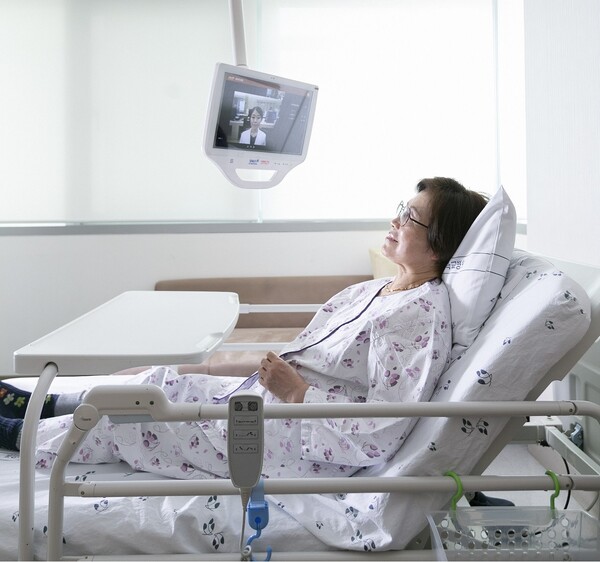Seoul National University Bundang Hospital (SNUBH) has unveiled an online consultation system, which facilitates virtual interactions between doctors, inpatients, and their guardians.

The hospital expects that this new platform will significantly enhance the convenience for patients and reduce waiting times associated with face-to-face consultations.
Rounds for hospitalized patients are an essential part of the treatment process, allowing doctors to check on patients' conditions and patients to answer questions about their illnesses.
Thankfully, the hospital had already installed a smart bedside station (SBS), which is a personalized touchpad attached to the bed of hospitalized patients. The SBS served as an apt foundation for the new system.
"The existing SBS content provided services like inpatient schedule notifications, customized health information, medication details, test results, certification applications, fee inquiries, and even entertainment services such as TV and internet," SNUBH Chief Information Officer Jung Se-young said. "However, recognizing the escalating demand for tailored medical information and the need to address physician workload burden efficiency, we've expanded its functions and incorporated the online consultation feature to provide a safe non-face-to-face consultation system."
Jung stressed that this system is expected to revitalize the consultation process by facilitating detailed explanations and sharing treatment plans for doctors.
"Also, the new system allows guardians of patients to participate in the consultation during times when hospital visits are challenging," Jung said.
He emphasized the benefits, stating, "Unlike the conventional approach of only voice explanations, the ability to share visual data such as test and treatment results enhances comprehension among patients and guardians."
Jung also highlighted the hospital's use of the system for drug prescription consultations to ensure patients take their drugs safely.
"We will target patients who are taking medications that require careful dosing, such as anticoagulants to prevent blood clots, elderly patients over 65, patients who need to take multiple medications simultaneously, or patients with poor adherence," Jung said. "Online medication counseling is expected to be similar to face-to-face medication counseling in improving medication adherence and safety as patients and pharmacists can interact with each other through SBS."
However, a comparative analysis against face-to-face consultation will only be feasible once the online medication consultation stabilizes, he added.
Although the system is in the initial phase, Jung expressed his optimism about the potential of online consultations, especially for infectious disease patients or those requiring isolation.
"We envision a future where Internet of Things (IoT) technology will be at the forefront in offering an efficient and safe smart hospital experience for all our patients," he said.
Related articles
- Seoul National University Bundang Hospital revolutionizing patient care with 5G technology
- SNUBH confirms world's 1st genotype-specific prognosis of female patients with Alport syndrome
- SNUBH, UEMC use AI to improve accuracy, reduce cost of stent procedures
- SNUBH, Kai Health secure ₩1.6 billion for AI-driven IVF embryo selection research

